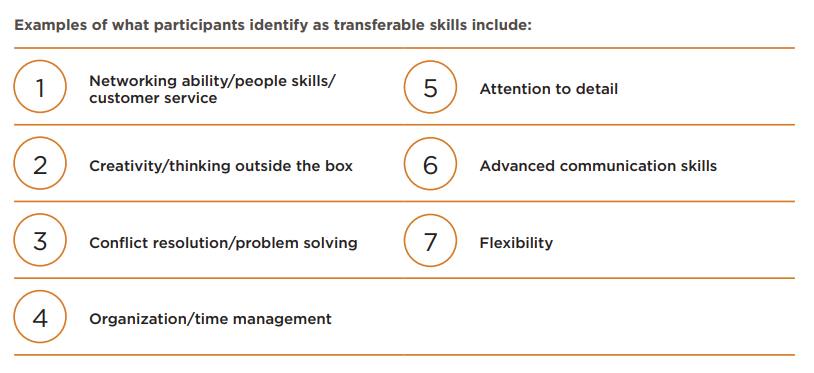Table of Contents
Key Findings
- Through a series of in-depth discussions with young Canadians at the crossroads between high school and post-secondary education, we found that most think they know which skills employers need.
- Students are mainly interested in learning about transferable skills and knowing which skills are most at risk of becoming obsolete in the future.
- However, the students find it challenging to translate their understanding of skill requirements into concrete choices about education, training and careers.
Introduction
When stepping into post-secondary education, students are at crossroads while they make important decisions and investments amid considerable uncertainty. While this may be the unavoidable norm, better career development and targeted labour market information (LMI) can support students in making informed career decisions and successful transitions by providing data and insights on educational and labour market pathways. That is why we sat with current and prospective post-secondary students to chat about their careers and life choices, and how LMI can better support them.
We partnered with Refresh Market Research to conduct a qualitative study of first-year college and university students (Box 1). We conducted indepth online discussions with 35 young Canadians to learn more about how they decided to pursue post-secondary education (PSE) and how they chose their institutions and programs.
We sought to find out what types of LMI were or could be useful to students in making their decisions. The group discussed three types of LMI: skill requirements, wages and job outlooks. This LMI Insight Report focuses on skill requirements and how to best support students in making informed decisions about PSE and labour market pathways. As part of this series, LMI Insight Report no. 21 explored issues related to wages.
This study builds on the findings of the public opinion research that the Labour Market Information Council (LMIC) previously conducted on different groups of Canadians. These findings told us that the skills required for jobs are among the most sought-after types of LMI for all Canadians, including students.
The students we consulted realize the world of work is changing rapidly and acknowledge their careers may not be linear. They understand that beyond formal training and education, the jobs of the future will require a complex set of skills. They feel they have a good grip on what employers are looking for, and they are trying to shape their decisions accordingly. However, connecting their understanding of skills - those they possess, those they will acquire through education, and those demanded by employers - to a successful career pathway is difficult. As a result, despite recognizing the importance of skills, the participants feel somewhat lost in terms of how to turn their understanding of skills into action.
What Are Skills, Anyway?
To make sure job market information caters to students’ needs, it is important to understand what students mean by "skill," what type of information they expect, how they want it to be presented and how they envision future skill needs. Admittedly, defining skills is not an easy task, and students are not the only group to find it challenging. The word is often used as a catch-all to describe a broad range of job characteristics. Employment and Social Development Canada (ESDC) recently created a definition as well as a list (or taxonomy) of skills in Canada that is helping to clarify the issue (Box 2). In our discussions with PSE students, we found the students similarly define skills as the ability to use knowledge to carry out certain tasks effectively and efficiently.
Tell Me More About Transferable Skills
The students understand that when they start their careers, they will require many different skills to succeed in the world of work, some of which may come naturally while others will have to be acquired through education, training and practice. Among the myriad types of skills, the students mainly want to learn about transferable skills. In their opinion, skills that are transferable between jobs, employers and industries are crucial because, as one participant puts it, "possessing these skills allows for a person to be a very positive influence in the workplace." Overall, the participants see transferable skills as including creativity, advanced communication skills, a flexible attitude and the ability to work in groups.
Box 1: Online Qualitative Study Methodology
We partnered with Refresh Market Research to engage first-year post-secondary education (PSE) students with an in-depth online discussion forum focusing on their use of labour market information to make choices about their PSE and career pathways.
The project was rolled out in April and May of 2019 and consisted of a series of engaging and thought-provoking exercises during a three-day online discussion forum. Prior to the discussion, participants were given homework to make them think about their educational journeys - from initially considering a career direction to selecting a field of study to enrolling in a post-secondary institution.
In total, we recruited 35 participants aged 17 to 20 who had just completed either their first year of PSE in the spring of 2019, or their last year of high school and were enrolled in a PSE program starting in the fall. As shown in the table below, we aimed to ensure participants represented a broad range of regions and institution types.
| Distribution | Categories | Number of participants |
|---|---|---|
| Geographic Distribution | North (Yukon, Northwest Territories and Nunavut) | 5 |
| West (British Columbia, Alberta, Manitoba and Saskatchewan) | 9 | |
| Ontario | 6 | |
| Quebec | 7 | |
| East (Nova Scotia, New Brunswick, Prince Edward Island and Newfoundland and Labrador) | 8 | |
| Education | Technical/Vocational College | 2 |
| Community College | 5 | |
| University | 28 |
Moreover, the students recognize that the rapid pace at which the world of work is changing reduces the life span of technical skills, making transferable skills more important than ever, as now workers move more frequently between jobs and across industries. In addition, the transferable skills listed by the participants are similar to the Government of Canada’s list of essential skills required for workplace success and sustainable lifelong learning. ESDC is currently updating the framework of essentials skills to reflect the labour market’s changing skills needs.
A Changing World
As technological advancements drive change, concerns abound regarding whether the jobs which students are training for today will still exist when they graduate. Students recognize that the skills sought by employers are rapidly evolving. During the online discussions, students asked questions like: Will my job be around for the better part of the future? Will it be taken over by technology? Will my skills be outdated once I graduate?
Unsurprisingly, students are very interested in obtaining information about which skills will evolve or become obsolete in the future. For some, this is a matter of existential concern. One participant observed that "without adapting and learning the skills of tomorrow, you will not be able to survive in the future." Comments like this suggest that students are anxious about the future and the extent to which their training will prepare them for it. It’s important to note that history shows that while technological advances have created a net positive number of jobs, the students did not inquire about which jobs or skills were likely to be enhanced by technology in the future. This suggests a greater focus on the fear of technology rather than on the potential benefits and job opportunities that technological transformation might generate.
Box 2: Skills and Competency Taxonomy
In August 2019, LMIC, Statistics Canada and Employment and Social Development Canada (ESDC) released a joint publication to present the new ESDC Skills and Competencies Taxonomy, along with suggestions to identify the skills associated with Canada’s National Occupation Codes.
The taxonomy defines skills as developed capacities that someone must have in order to be effective in a given job, role, function, task or duty. It includes seven broad categories, of which skills is one. There are 47 skill descriptors plus another 281 descriptors across the other six categories.
The students also recognize that the exact skills needed in the future are impossible to forecast; that jobs will evolve, appear and disappear; and that adaptability will be valued more than length of time on the job. Students entering the labour market will require many different skills and competencies acquired through practice and training. Their ability to set themselves apart will depend on their capacity to continuously learn, absorb information and connect the dots across disparate disciplines. Indeed, practical work experience is an important aspect of skill development. Through work placements, students can learn and develop in-demand skills. Studies are emerging that explore the impact of an experience gap (rather than a skills gap) among new hires. Across Canada, there is a renewed focus on experiential learning to create more work experience opportunities for students. The national Student Work Placement Program is an example of this trend.

Information and Career Development That Matters
Although students acknowledge that it is impossible to predict the exact skills that will be in demand in the future, they still need guidance in selecting which skills to learn in school. The participants said they most want to know what skills they will need for future success; what skills they already possess that can be built upon and developed over time; what skills they can learn outside of school; and what skills they will need to tackle sudden changes in the job demands of the future. This reveals a need for career development guidance to help students make informed career decisions, identify their existing skills, understand the changing nature of skills requirements and learn the strategies they need to manage ongoing transitions successfully.
How can we present students with information that will speak to them and support the stressful process of deciding whether to pursue PSE and choose a programme and institution? We presented participants with four statements (Figure 1) about skills and unpacked what is relevant and what is not. What we discovered is that information about skills (such as what skills are in demand) is always seen as too general, whether it is presented by industry or occupation. For example, in statement 1, a participant notes:
Why are great problem-solving skills necessary? What do great problem-solving skills look like? How do you demonstrate great problem-solving skills? Will the employer train the employee and, if not, where can an individual acquire these skills?
Participants note that it is essential to provide additional context to link skills to specific career pathways (occupations or industries). However, it is also important to explain how to acquire these skills, how to articulate them to prospective employers, and how to demonstrate them across diverse work settings. Another participant found statement 4 to be "very important for someone who wants to work in X - it is not only telling them they have to be a good presenter, but what resources they can access in order to achieve or enhance that skill."

Overall, students want actionable insights into the skills they will need to succeed. They want to know what they need to do today to gain the skills that will enable them to navigate the labour market tomorrow. The information has to be specific to their desired career path and practical (e.g. where to get training). Across Canada, efforts are being made to ensure workers have access to the training and education they need to acquire in-demand skills. The Future Skills Centre was created to ensure Canadians have the skills to succeed in the future. The centre will develop, test and evaluate new approaches to skills development to identify emerging skills for today and tomorrow. It will also share results and best practices with stakeholders across the public, private and not-for-profit sectors to ensure workers and students in diverse regional economies have the skills for success.
The Way Forward
In our discussions with students about how they made their education decisions and how they envision the future, it was clear that skills information is an essential component of that process. Students understand skills as the ability to use knowledge to carry out certain tasks effectively and efficiently. They are mainly interested in learning about transferable skills. They were also curious to learn about how skills will evolve or become obsolete in the future. In terms of LMI, their highest priority was to have information about skill requirements organized according to potential career pathways (i.e., within an industry or occupation).
Several gaps remain in the LMI system when it comes to providing students with such information. These include a better and deeper understanding of the relationships between jobs and skills and, ultimately, better information about training and education pathways available by skills in Canada. LMIC is collaborating with its partners to bridge these gaps.
Acknowledgments
This LMI Insight Report was prepared by Emna Braham and Bolanle Alake-Apata of LMIC. We would like to thank our National Stakeholder Advisory Panel (NSAP) and other stakeholders for their support in reviewing the report. In particular, the team would like to thank Sareena Hopkins (Canadian Career Development Foundation), Scott McLean (Statistics Canada), Phil Jarvis (Coalition Transitions Canada), David Hartnett (Employment and Social Development Canada), and Asa Motha-Pollock (MaRS Discovery District) for their feedback.
For more information about this LMI Insight Report or other LMIC activities, please check our publications page. You may also contact Bolanle Alake-Apata at bolanle.alake-apata@lmic-cimt.ca or Tony Bonen (Director, Research, Data and Analytics) at tony.bonen@lmic-cimt.ca. Check out the Survey Results by Population Groups Dashboard and previous editions of LMI Insight Reports on the types of wage information that students need. Stay tuned for the release of the final report on these series on job outlooks.


